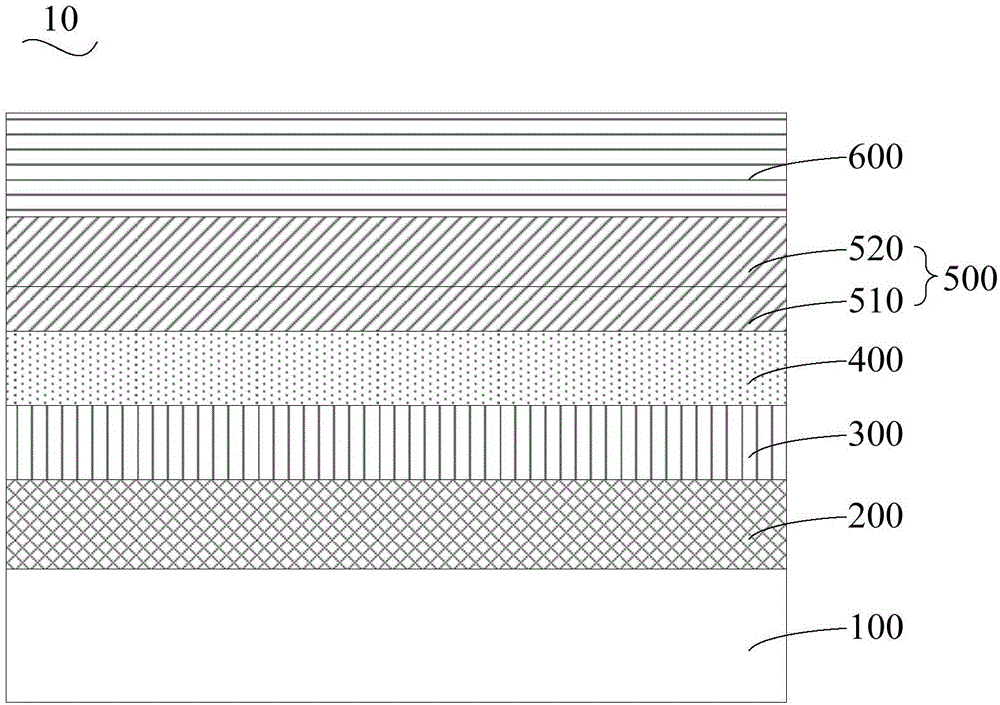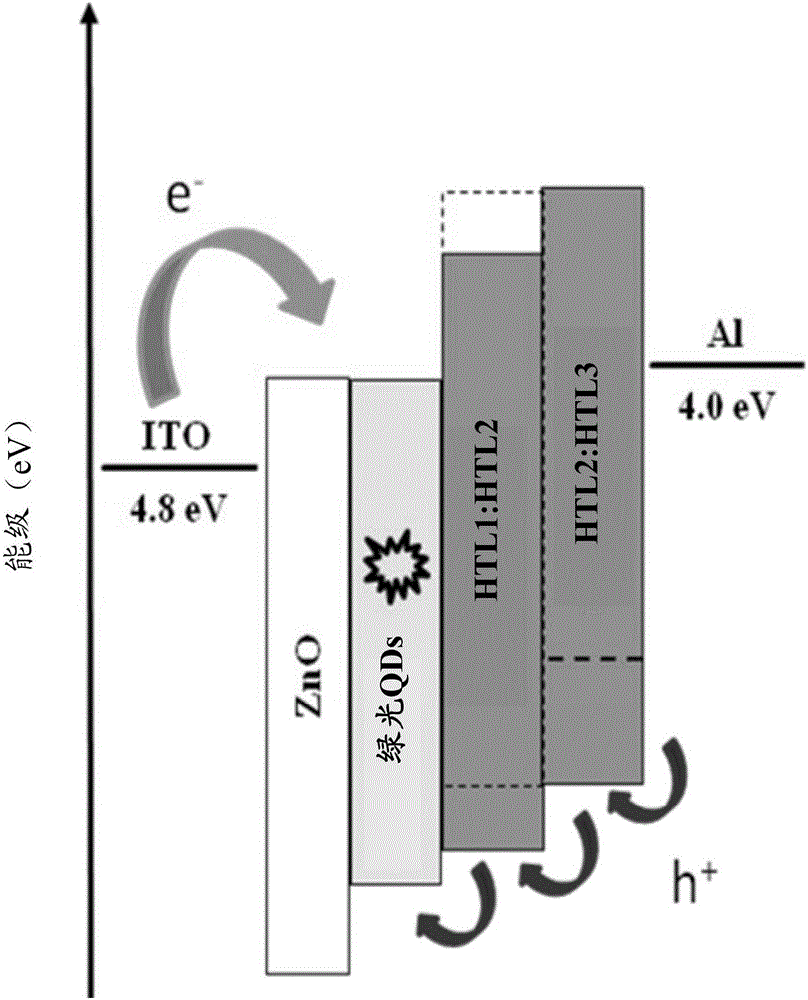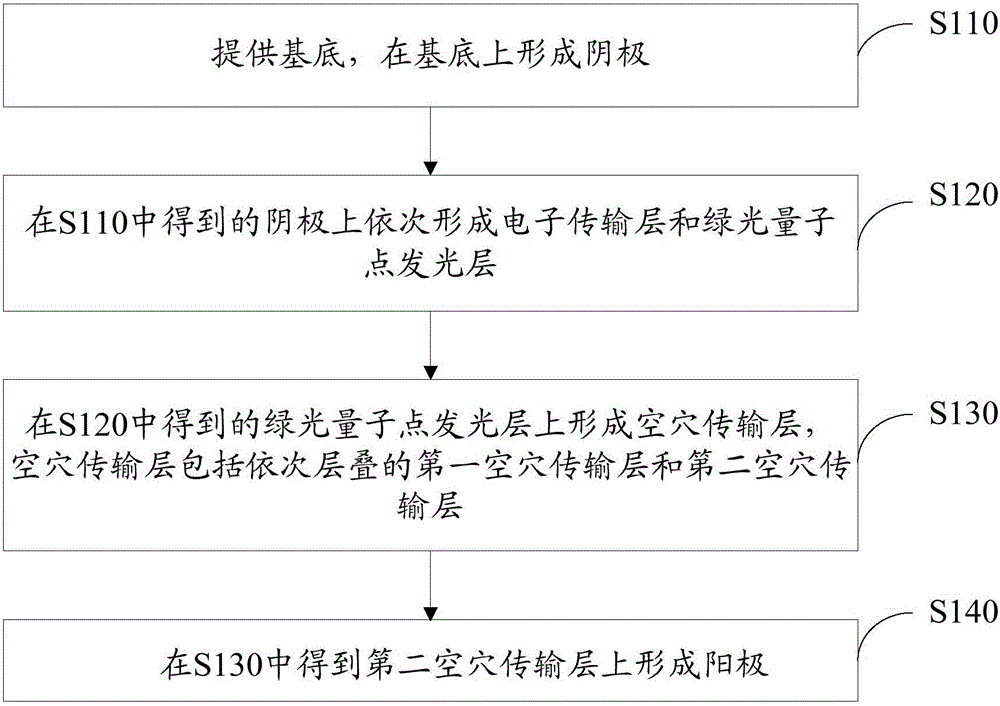Inverted green light quantum dot film electroluminescence device
A technology for electroluminescent devices and quantum dots to emit light, which is applied in the direction of electro-solid devices, electrical components, semiconductor devices, etc. question
- Summary
- Abstract
- Description
- Claims
- Application Information
AI Technical Summary
Problems solved by technology
Method used
Image
Examples
preparation example Construction
[0049] In addition, the present invention also provides a method for preparing the above-mentioned inverted green light quantum dot thin film electroluminescent device 10, such as image 3 As shown, the method includes the following steps S110-S140.
[0050] S110, providing a substrate, and forming a cathode on the substrate.
[0051] The material of the substrate can be glass, and the substrate can be ultrasonically treated with detergent, acetone, ethanol and isopropanol for 15 minutes each. Then vapor deposition, sputtering, sputtering or electrochemical vapor deposition on the substrate to form the cathode. The material of the cathode can be indium tin oxide (ITO), fluorine-doped tin oxide (FTO), aluminum-doped zinc oxide (AZO), indium-doped zinc oxide (IZO), etc., and the thickness of the cathode is 80nm-200nm.
[0052] Preferably, indium tin oxide (ITO) is sputtered onto the glass substrate by sputtering.
[0053] In this embodiment, after the cathode is formed on the...
Embodiment 1
[0065] The structure of the inverted green light quantum dot thin film electroluminescent device is a substrate, a cathode, an electron transport layer, a green light quantum dot light-emitting layer, a hole transport layer and an anode, wherein the hole transport layer includes a laminated first hole transport layer and a second hole transport layer. hole transport layer. The first hole transport layer is in direct contact with the green light quantum dot light emitting layer. Wherein, the thickness of the first hole transport layer is 8 nm, and the material of the first hole transport layer is a mixture of the first hole transport material (HTL1) and the second hole transport material (HTL2), wherein HTL1 is 2- Hydroxy-3-methyl-2-cyclopenten-1-one (mCP), HTL2 is 8,8-bis(4-(9hydro-carbazol-9-yl)phenyl)-8hydro-indole [3,2,1-de]acridine (FPCC), the mass ratio of mCP to FPCC is 2:1. The thickness of the second hole transport layer is 25nm, and the second hole transport layer i...
Embodiment 2
[0071] The thickness of the first hole transport layer in the inverted green light quantum dot thin film electroluminescence device of the present embodiment is 5nm, and the material of the first hole transport layer is the mixture that HTL1 and HTL2 form, and wherein HTL1 is mCP, and HTL2 is FPCC, The mass ratio of mCP to FPCC is 4:3. The thickness of the second hole transport layer is 15nm, and the material of the second hole transport layer is a mixture of HTL2 and HTL3, wherein HTL2 is FPCC, and HTL3 is WO 3 , FPCC and WO 3 The mass ratio is 3:4. All the other are identical with embodiment 1.
[0072] The specific preparation method of the inverted green light quantum dot thin film electroluminescent device is the same as that of Example 1.
[0073] The HOMO energy level of the first hole transport layer was 6.1 eV, and the HOMO energy level of the second hole transport layer was 6.03 eV.
[0074] The brightness test was carried out on the prepared inverted green light...
PUM
| Property | Measurement | Unit |
|---|---|---|
| Thickness | aaaaa | aaaaa |
| Thickness | aaaaa | aaaaa |
| Thickness | aaaaa | aaaaa |
Abstract
Description
Claims
Application Information
 Login to View More
Login to View More - R&D
- Intellectual Property
- Life Sciences
- Materials
- Tech Scout
- Unparalleled Data Quality
- Higher Quality Content
- 60% Fewer Hallucinations
Browse by: Latest US Patents, China's latest patents, Technical Efficacy Thesaurus, Application Domain, Technology Topic, Popular Technical Reports.
© 2025 PatSnap. All rights reserved.Legal|Privacy policy|Modern Slavery Act Transparency Statement|Sitemap|About US| Contact US: help@patsnap.com



